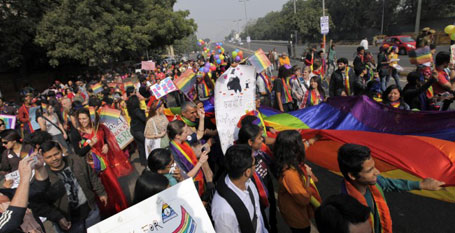This Wednesday, the LGBT community in India and abroad was dismayed by a Supreme Court decision that ruled that a 2009 abolition of section 337 of the penal code by the High Court was unlawful. The decision effectively reinstates the law that bans “sex against the order of nature”, interpreted as gay sex.
The Supreme Court decided that only India’s Parliament could change the law, ruling that the Delhi High Court had gone beyond its powers with its decision to alter the penal code. This original 2009 ruling which made gay sex between consenting adults exempt from the penal code was achieved after a decade-long legal battle from the Naz foundation.
The law that has been re-instated was drafted in the 19th Century, dating back to British colonial rule and means that gay sex can be punished by up to 10 years in jail. The news comes as a massive set back to LGBT rights – affecting 40 million gay men, or 17.5% of the world’s gay population.
The LGBT community in India immediately expressed shock and distress at the ruling. Along with demonstrations and parades, Arvind Narrain, a lawyer for the Alternative Law Forum gay rights group said “we are very angry about this regressive decision of the court.” And Ashok Row Kavi, of the activist group Humsafar Trust, said: “This is a very sad day for us, we are back to square one in our fight for the democratic rights of the gay community.”
There have, however, been some positive signs since Wednesday, with other sections of Indian society also expressing their unhappiness. Indira Jaisingh, Additional Solicitor General of India, stated “what surprises me is the double standards here,” pointing to the back-and-forth between parliament and the Supreme Court. Promisingly, Law Minister Kapil Sibal said “all options are being considered to restore the 2009 Delhi High Court order.”
Most importantly, India’s ruling party has distanced itself from the decision and indicated that they will move to re-decriminalize homosexuality despite it being a contentious issue in the general elections just 5 months away. Congress party President Sonia Gandhi stated “I hope Parliament will address this issue and uphold the constitutional guarantee of life and liberty to all citizens of India, including those directly affected by this judgment.’
The move has also been denounced by global voices. Sir Graham Watson MEP, Chair of the EU-India Parliamentary Delegation, said: “It is shameful that this colonial law … will enter into force again.” The United Nations have given a damning verdict on the Supreme Court’s decision. Human Rights Chief, Navi Pillay, said the move “violates the rights to privacy and to non-discrimination enshrined in the International Covenant on Civil and Political Rights.”
As Pillay also noted “The Supreme Court of India has a long and proud history of defending and expanding protection of human rights, this decision is a regrettable departure from that tradition,” which is perhaps why the ruling has caused such dismay. As India is a country that looked to be making (albeit slow) progress towards LGBT equality, it is also feared that the move sets an ugly example for the 76 other countries in the world that criminalize gay sex.












 打印版本
打印版本


















读者回应
I fear more is to come. With ignorance and religion this will show its head more as well. Specially where those two factors are strong. This includes the USA, as we have a bumper crop of people who would applaud this judicial decision.
Let see who is colonial.
Everybody possible to make mistake, include you and me.
Include country that made colonial.
Here you should able to make identify that not all colonials are the same.
IF Colonials Hold Hollybook they will not ever change Rule because You read Hollybook do not want to be changed, to be added or substracted.
Making new interpretation of Hollybook, the same as making change.
Who is Colonial of India?
See again now, How is situation regarding gay/LGBT in Country that made colonial in India? Is it the same?
If it different, then you should not blame colonial but your law makers.
Because everybody possible to make mistake, include colonial and law maker.
But Does everybody make improvement or realize that He/she/gay made mistake?
请先登入再使用此功能。